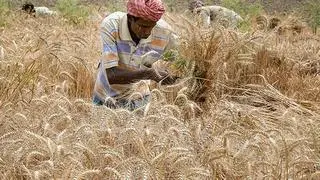Stating that there was hardly any domestic demand for Goa’s low-grade iron-ore (below 62Fe), the Goa Chamber of Commerce and Industry (GCCI), representing trade and industry in the State, has demanded that the 30 per cent export duty on it be scrapped to facilitate export.
This demand has been made in GCCI’s memorandum submitted to the Union Finance Ministry ahead of the upcoming national Budget, which states that the present high export duty has made export of Goan low-grade ore totally unviable, with its cascading effect on Goa’s economy.
The Finance Ministry had raised the export duty on iron ore from 20 per cent to 30 per cent from December 2011.
The GCCI has argued that the State’s mining sector is different from the larger iron-ore producing States such as Odisha, Karnataka, Chhattisgarh and Jharkhand, and that ore produced in Goa is of a much lower grade (average grade 54 per cent) compared to the rest of the country.
No takersIt reiterated that the Goan ore has no takers in the Indian steel industry.
The availability of higher-grade ores in the Eastern sector or in Bellary (Karnataka) renders Goa ore unattractive. Using low-grade iron-ore mined in Goa increases the costs of steel-making, especially as it necessitates the use of imported coking coal vis-à-vis coke. The logistics costs of shipping the ore from Goa are an added negative for iron and steel plants in the country.
As for manufacturing in Goa, the State is unsuitable for steel plants, primarily because of regulatory restrictions, it being declared a tourist State, and unavailability of large land-tracts, says GCCI. It adds that the low-grade iron-ore is hematitic and thus unsuitable for pelletisation, given its high energy consumption.
It has expressed concern that the Central and State governments together would lose substantial revenue in terms of royalties, VAT , duties, service tax, etc., which are direct in nature, and that the cessation of exports will impact State revenues severely.
Ports hitThe memorandum also speaks of the adverse effect of a decline in iron ore exports on ports in Goa as iron-ore accounts for 85 per cent and 95 per cent of total exports of the Mormugao Port and Panaji Port, respectively.
Adding to the GCCI’s concern, president of the Goa Iron Ore Exporters Association Shivanand Salgaoncar feels most of the recent investments made in infrastructure (both government and private) to cope with the increased export market demand will become unviable and would lead to higher production cost of exportable grades.
An estimated 30,000 people, comprising mine workers, barge workers, machine operators, truck drivers, mechanics, labourers, etc., depend directly on mining for their livelihoods, which will be threatened if exports cease, the GCCI memorandum said.
The loss of business for people involved in mining-related activity would, will, again hit Central and State revenues, says GCCI and warns that, faced with a budget deficit as it is, the State Government cannot absorb the economical and social fallout.
As of now, mining activity, including extraction and exports, is yet to resume in the State after the ban imposed by the Supreme Court in October 2012, even though the ban order was relaxed last May.






Comments
Comments have to be in English, and in full sentences. They cannot be abusive or personal. Please abide by our community guidelines for posting your comments.
We have migrated to a new commenting platform. If you are already a registered user of TheHindu Businessline and logged in, you may continue to engage with our articles. If you do not have an account please register and login to post comments. Users can access their older comments by logging into their accounts on Vuukle.